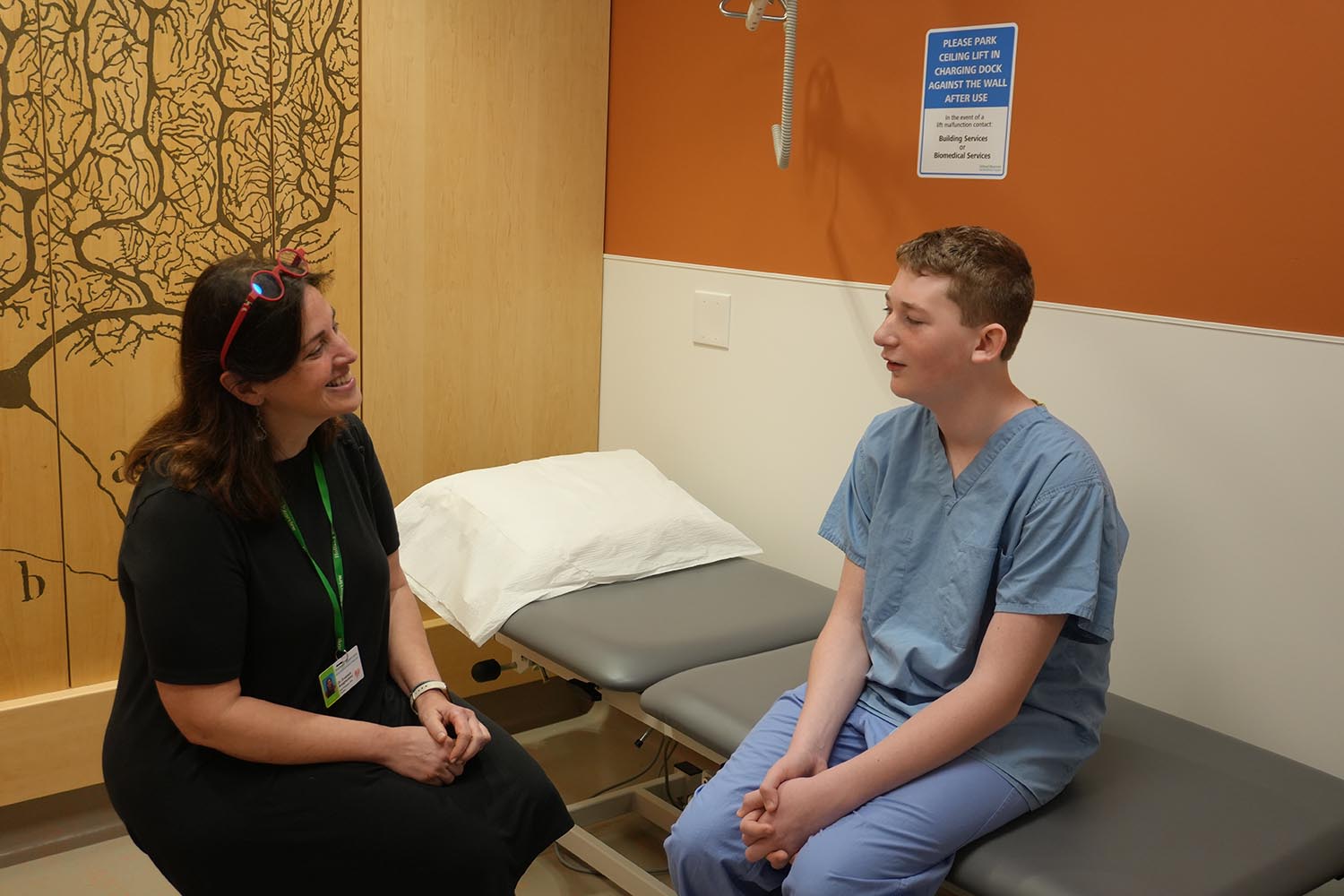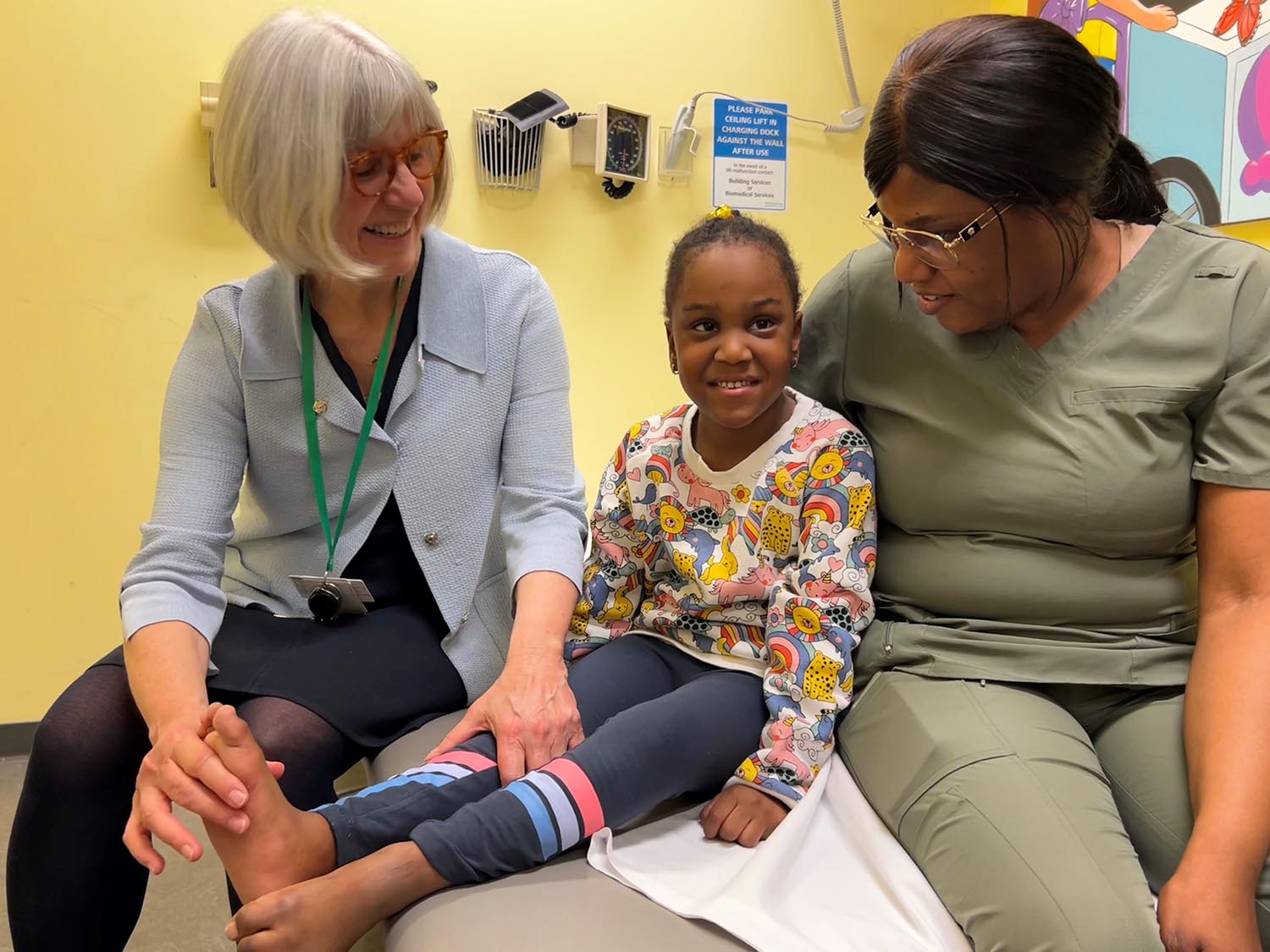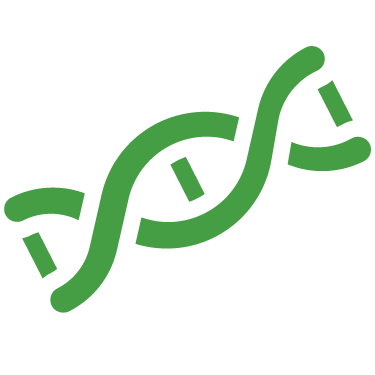
Personalizing health
The number of children and youth in Ontario with disabilities and developmental differences continues to grow, and the complexity of their care and service needs is increasing as well. We see this trend reflected at Holland Bloorview with the following stats:
Holland Bloorview is meeting this growing demand through innovative, data-informed care, precision health and research – including using AI to predict medication outcomes, partnering with a clinical trials network to advance discoveries in rare disease, tailoring autism assessments and understanding the underlying biology of neurodevelopmental conditions.
Tailoring assessments
According to a 2019 Canadian health survey on children and youth (PDF), one in 50 Canadian children and youth are diagnosed with autism and the demand for autism diagnostic services keeps increasing. In the last year alone, Holland Bloorview’s waitlist grew by six per cent, with increasing referral rates over the last four years.
As one of five autism diagnostic hubs in Ontario, Holland Bloorview has among the lowest wait times in the province for an assessment. What’s more, the autism clinical services team is triaging clients to the appropriate care pathway that takes into consideration clients’ clinical, medical and psychosocial complexities. This approach maximizes resources and ensures each client has access to the right interdisciplinary team to meet their diagnostic needs.
To support families waiting for an assessment, the team has developed resources including a video of what to expect during an assessment, online parent-led forums and tip sheets among other resources. They have also recently developed an empowering video series of autistic youth sharing their experiences, including autism assessments.
![Amira [left] shares a moment with her sister Aaliyah, in the hospital’s front courtyard. The teen recently shared her autism journey as part of an empowering video series featuring autistic youth talking about their experiences, including assessments.](https://impactreport.hollandbloorview.ca/wp-content/uploads/2025/05/Amira-and-Aaliyah-1500.jpg)



Learn how a research team, led by Dr. Azadeh Kushki, a senior scientist, and Dr. Danielle Baribeau, a clinician scientist, is exploring how AI can be used to pinpoint the right medication for neurodivergent children and youth at the right time.
Advancing precision health
Dr. Evdokia Anagnostou, vice president of research, is co-leading the Province of Ontario Neurodevelopmental Disorders Network (POND). The translational research network is dedicated to understanding the biological underpinnings of neurodevelopmental conditions, irrespective of diagnostic labels, so that it can inform personalized interventions and supports. The network also employs advanced analytic approaches including AI strategies to advance precision-health approaches in pediatric disability.

Dr. Evdokia Anagnostou, vice president of research, is co-leading the Province of Ontario Neurodevelopmental Disorders Network (POND). The translational research network is dedicated to understanding the biological underpinnings of neurodevelopmental conditions, irrespective of diagnostic labels, so that it can inform personalized interventions and supports. The network also employs advanced analytic approaches including AI strategies to advance precision-health approaches in pediatric disability.
With five sites across the province and funding from the Ontario government through the Ontario Brain Institute, POND includes Canada’s first clinical trials network dedicated to neurodevelopmental conditions, advancing interventions based on precision-health principles, and bringing international trials to Canada.
Moreover, advanced analytics like AI and machine learning are helping researchers to accelerate the adoption of precision-health principles into health-care systems faster. For example, over the past year, POND data was used to develop algorithms that were implemented in the medical records of neurodiverse children and youth to guide personalized medication choices by their clinicians.
- Dr. Evdokia Anagnostou, vice president of research


in funding


Additionally, the Bloorview Research Institute joined with an elite group of health-care organizations in March to launch the Canadian Precision Health Initiative. Backed by a $12 million investment from the federal government through Genome Canada, researchers led by Dr. Anagnostou will help sequence the DNA of 10,000 individuals to create Canada’s largest-ever genomic data set focused on childhood-onset disabilities.
Unlocking the genetic code
Cerebral palsy (CP) is the most common childhood-onset physical disability that affects children’s motor skills development. But the genetic contributors to CP have remained largely unknown until now – and can unlock the key to precision medicine.
In a recent large-scale Canadian genomics study, Holland Bloorview, SickKids and McGill University Health Centre researchers found that one in 10 children have a genetic variant connected to CP.
By understanding the underlying mechanisms of how genes interact with their environment throughout a child’s prenatal, perinatal and post-natal journey, this research will hold the key to developing more targeted treatments for children living with CP.
The study is part of CP-NET, a research-based initiative led by Dr. Fehlings that brings together researchers, clinicians and stakeholders in Ontario to transform the lives of those with or at risk for cerebral palsy and their families by accelerating the development of new neuroscience discoveries and mobilizing research knowledge.


